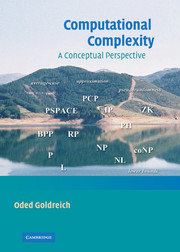Book contents
- Frontmatter
- Contents
- List of Figures
- Preface
- Organization and Chapter Summaries
- Acknowledgments
- 1 Introduction and Preliminaries
- 2 P, NP, and NP-Completeness
- 3 Variations on P and NP
- 4 More Resources, More Power?
- 5 Space Complexity
- 6 Randomness and Counting
- 7 The Bright Side of Hardness
- 8 Pseudorandom Generators
- 9 Probabilistic Proof Systems
- 10 Relaxing the Requirements
- Epilogue
- Appendix A Glossary of Complexity Classes
- Appendix B On the Quest for Lower Bounds
- Appendix C On the Foundations of Modern Cryptography
- Appendix D Probabilistic Preliminaries and Advanced Topics in Randomization
- Appendix E Explicit Constructions
- Appendix F Some Omitted Proofs
- Appendix G Some Computational Problems
- Bibliography
- Index
6 - Randomness and Counting
Published online by Cambridge University Press: 05 June 2012
- Frontmatter
- Contents
- List of Figures
- Preface
- Organization and Chapter Summaries
- Acknowledgments
- 1 Introduction and Preliminaries
- 2 P, NP, and NP-Completeness
- 3 Variations on P and NP
- 4 More Resources, More Power?
- 5 Space Complexity
- 6 Randomness and Counting
- 7 The Bright Side of Hardness
- 8 Pseudorandom Generators
- 9 Probabilistic Proof Systems
- 10 Relaxing the Requirements
- Epilogue
- Appendix A Glossary of Complexity Classes
- Appendix B On the Quest for Lower Bounds
- Appendix C On the Foundations of Modern Cryptography
- Appendix D Probabilistic Preliminaries and Advanced Topics in Randomization
- Appendix E Explicit Constructions
- Appendix F Some Omitted Proofs
- Appendix G Some Computational Problems
- Bibliography
- Index
Summary
I owe this almost atrocious variety to an institution which other republics do not know or which operates in them in an imperfect and secret manner: the lottery.
Jorge Luis Borges, “The Lottery in Babylon”So far, our approach to computing devices was somewhat conservative: We thought of them as executing a deterministic rule. A more liberal and quite realistic approach, which is pursued in this chapter, considers computing devices that use a probabilistic rule. This relaxation has an immediate impact on the notion of efficient computation, which is consequently associated with probabilistic polynomial-time computations rather than with deterministic (polynomial-time) ones. We stress that the association of efficient computation with probabilistic polynomial-time computation makes sense provided that the failure probability of the latter is negligible (which means that it may be safely ignored).
The quantitative nature of the failure probability of probabilistic algorithms provides one connection between probabilistic algorithms and counting problems. The latter are indeed a new type of computational problems, and our focus is on counting efficiently recognizable objects (e.g., NP-witnesses for a given instance of set in NP). Randomized procedures turn out to play an important role in the study of such counting problems.
Summary: Focusing on probabilistic polynomial-time algorithms, we consider various types of probabilistic failure of such algorithms (e.g., actual error versus failure to produce output). This leads to the formulation of complexity classes such as BPP, RP, and ƵPP. […]
Information
- Type
- Chapter
- Information
- Computational ComplexityA Conceptual Perspective, pp. 184 - 240Publisher: Cambridge University PressPrint publication year: 2008
